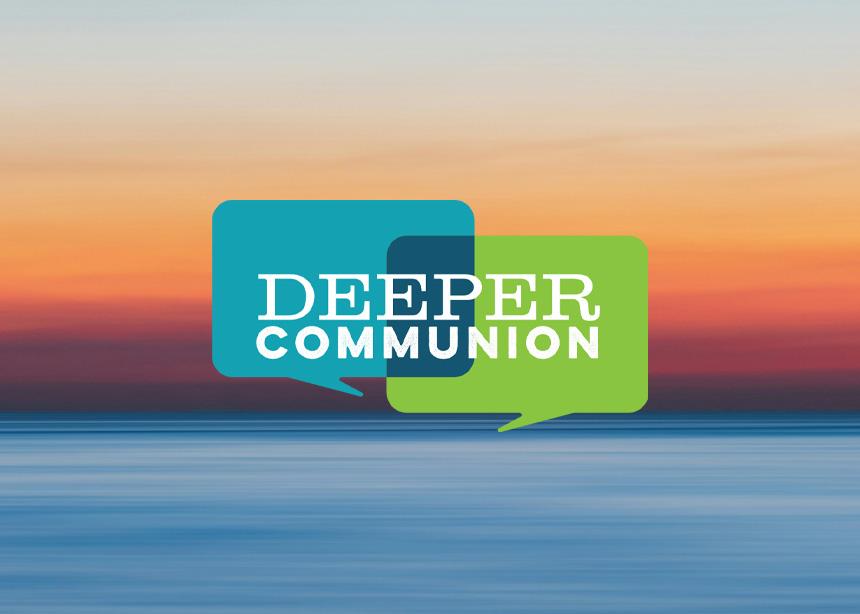When I started seminary three years ago, I realized I didn’t know how to talk about God.
I was motivated to go to seminary because of my love for the Mennonite church. I wanted to deepen my understanding of how the church can draw people into forms of life that challenge us to transform boundaries constructed out of a fear of difference.
This desire led me to study theology in an ecumenical space where people from faith traditions different from mine would challenge my own tradition.
At Yale Divinity School, I noticed a pattern. While many of my peers spoke about their life in relation to particular images of God, I spoke about my life in relation to particular faith communities.
I shared stories of growing food alongside my neighbours who had arrived in Canada as refugees and preparing meals in the spirit of more-with-less. I recalled gatherings of friends who were present with my family in experiences of chronic pain. I spoke of walking the streets of Winnipeg to call for clean drinking water for our Treaty 3 neighbours.
Formed within the Anabaptist tradition, I learned to speak of my faith through the practices of my life. These practices offer a way of articulating God’s presence in the world without speaking about God directly.
In coming to Yale Divinity School, I stepped outside the faith communities where the grammar of life was recognized as the grammar of shared faith. In seminary, when I was asked to speak of God directly, my words failed me.
Why, I wondered, is it so hard to talk about God? Do other Mennonites struggle with this?
I began to ask. Over the last three years, in conversations with friends, mentors and leaders who are part of the Mennonite church, I’ve regularly posed two questions: Why are you part of the church? What does God look like or mean to you?
Repeatedly, I’ve heard people tell me they are drawn to church for the sense of community but are unsure how to speak about God.
Sara Wenger Shenk, in her book Tongue Tied, writes that “it is the discrepancy we feel between the magnetic pull of our deepest longings towardsa God of love and a contrived, false God that renders us voiceless.”
There are so many ways that the image of God has been distorted and contorted. God is often portrayed as one who possesses, controls and has mastery over all things. If we believe that we are made in the image of this God, then we too are tempted to relate and act in this way.
The challenge is to speak of God from places that are still burdened by a desire to control bodies, land, behaviour and longings. The challenge is to believe God will be recognizable in the midst of the given, the common and the ordinary.
As I’ve worked, prayed and learned alongside friends from many different faith traditions, I’ve come to believe that God is made visible through our everyday efforts to give voice to what we desire, fear, trust and doubt. It is our love for each other, more than anything, that compels us to find words.
These days, in my attempts to say something about God, I reach towards the image of Woman Wisdom. She reminds me, “Listen, for I have trustworthy things to say” (Proverbs 8:6).
During my time at Yale, Woman Wisdom has become my companion. I recognize her in unexpected bursts of laughter, delight, playfulness and connection that interrupts places and interactions that are shaped by struggle and fear.
Wisdom invites me to speak freely about what I desire, long for, trust and doubt. This freedom is not defined by the ability to control my life, my place or my sense of God. Rather, it’s a freedom that compels me to intertwine my life with the lives of others and to trust that in the vulnerability of these connections I will become more whole, more human.
Wisdom continues to remind me that community is not an end in itself. Rather, perhaps community is the place where we practice making God visible to one another as we transform places that are divided by fear into places that attend to deep human flourishing.
Does this resonate, fellow columnists and readers? How do you speak about God? What images accompany you through your desires, longings and doubts?
– Anika Reynar is a student of religion and environmental management at Yale University in New Haven, Connecticut.
Inverse
By: Ryan Dueck
I was fascinated to read the opening lines of Anika’s article. I was struck by how my experience is almost the exact inverse of hers. Perhaps to my discredit, I did not go to seminary motivated by any great love for the church (Mennonite or otherwise) or desire for community. I was motivated by a kind of existential itch, a captivation with the question of God, meaning and what, if anything, could really be hoped for.
I did not struggle with language to talk about, or wrestle with, or agonize over God. My challenge was more in the realm of anchoring that talk in embodied communities and recognizing that while God does indeed encounter us as individuals, he has also bound us to one another in inconvenient, at times constraining, but ultimately liberating ways.
Anika ends her piece using the language of desire, longing, trust and doubt. She speaks also of a wisdom that affords the freedom to speak of these things freely. This resonates deeply with me, not least because I see all these things, and more, operating in the stories—individual and communal—radiating out from the empty tomb of the first Easter.
– Ryan Dueck, pastor at Lethbridge Mennonite Church, Lethbridge, Alberta
Bedrock
By: Cindy Wallace
I grew up in churches that talked about God as an impatient father. He was angry, jealous and omnipotent. He couldn’t stand our sinfulness, but he loved us, so he had his son killed to pay for our sins.
This way of talking about God has harmed many people, in part through the temptation Anika describes: to justify mastering, controlling and possessing by normalized angry power.
I cannot speak of God without bearing witness to that harm.
Yet against all odds, my heart still burns within me at the name of Jesus. I have learned to speak his name otherwise, through decades of listening to people, often those most familiar with weakness, who know in Jesus a God who upends all those death-dealing paradigms of power.
Jesus surprises me with weakness, with tenderness, with laughter. He eats with everybody, and he’s not even usually the host. He is angry at injustice yet also deeply inefficient. He heals, but almost never in the way I want him to.
This Jesus both comforts and unsettles. He’s not an atonement pawn but flesh and blood. Trembling for so many reasons, I speak of the God I see in him with this bedrock conviction: his love holds all things together. The world’s burning core is love.
– Cindy Wallace, professor of English at St. Thomas More College at the University of Saskatchewan
Unpacked
By: Justin Sun
If Anika asked me what God looked like or meant to me, I wouldn’t have a solid answer. Growing up, my language for God was a jumble—caught between the cultures and communication styles of an intergenerational immigrant community. “耶和华. 天父. 耶稣,” I would hear on top of, “Yahweh. Heavenly Father. Jesus.”
Unpacking this has been a lifelong project, even as I’ve simultaneously struggled to investigate and articulate paths forward. In this way, I imagine it was not so different growing up Chinese Canadian in the 2000s as it was growing up German Canadian Mennonite in the 1950-80s.
I love that at the core of this is language in faith communities. Appropriately, Anika links her question of God to church. The way people talk about God is, I imagine, deeply entwined with their reasons for being part of a faith community.
Often, I see how the disconnect between the faith of generations is rooted in language, and, like Anika gets at, not just in words directly about God but in the “ordinary.” In this, I think being multilingual is a gift.
Who is God in the gaps and translations?
– Justin Sun, youth pastor at Peace Mennonite Church, Richmond, B.C.






Add new comment
Canadian Mennonite invites comments and encourages constructive discussion about our content. Actual full names (first and last) are required. Comments are moderated and may be edited. They will not appear online until approved and will be posted during business hours. Some comments may be reproduced in print.